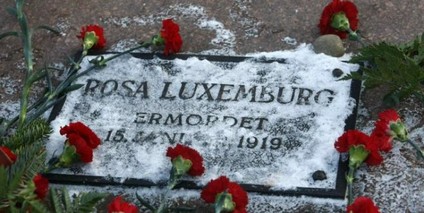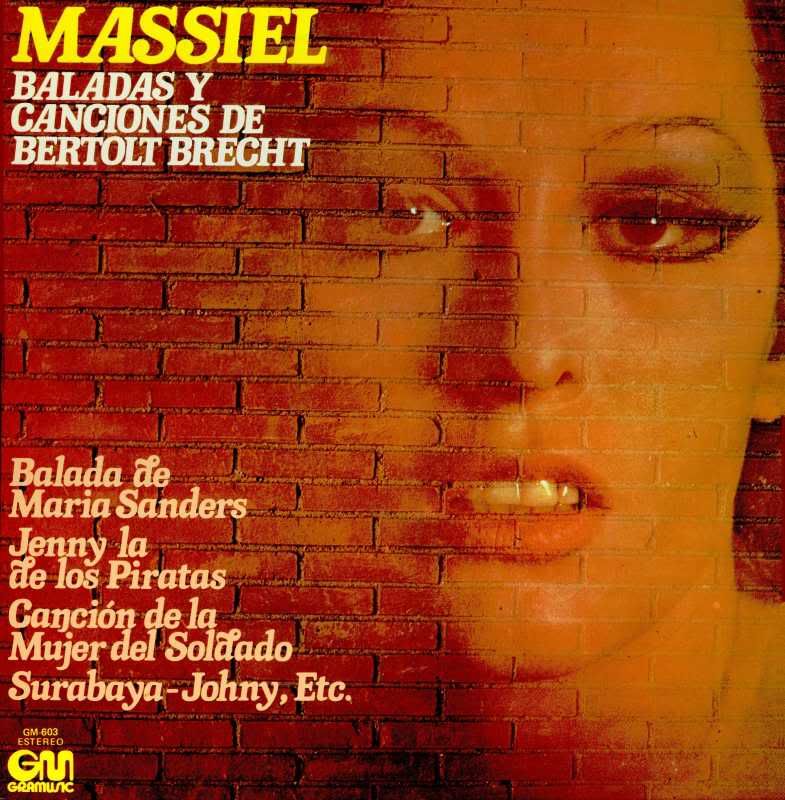 "Revolution is magnificent. Everything else is nonsense." - (Rosa Luxemburg)This weekend the annual Rosa Luxemburg and Karl Liebknecht demonstration, initiated in the German Democratic Republic and continued in today’s conditions takes place on Sunday 9 January 2011, 10am at Berlin Friedrichshain.The demonstration commemorates the murder of the two leaders of the German workers movement by reactionary Freikorps on the orders of the Social Democrat minister Friedrich Ebert.
"Revolution is magnificent. Everything else is nonsense." - (Rosa Luxemburg)This weekend the annual Rosa Luxemburg and Karl Liebknecht demonstration, initiated in the German Democratic Republic and continued in today’s conditions takes place on Sunday 9 January 2011, 10am at Berlin Friedrichshain.The demonstration commemorates the murder of the two leaders of the German workers movement by reactionary Freikorps on the orders of the Social Democrat minister Friedrich Ebert. For the first time in Marxist literature Karl Liebknecht took up the question of militarism in the imperialist period in his book
Militarism and Anti-Militarism which came out in 1907 and which led him to being sentenced to imprisonment. As a member of the Prussian Chamber of Deputies and the Reichstag he exposed the bosses of the military industries headed by Krupp for their warmongering policies and called for international proletarian solidarity as the decisive weapon in the struggle against militarism. Liebknecht welcomed the 1905 Revolution in Russia and came into a sharp political clash with the revisionists, defending the general mass strike as a special proletarian means of struggle. He denounced the assistance given by the German government to tsarism which was engaged in the suppression of the revolution and called upon the German proletariat to emulate the struggle of the Russian workers.
At the beginning of the First World War he did not initially break with the discipline of the Social-Democratic Party, voting for war credits on August 4th, 1914. Liebknecht soon corrected his position and on 2nd December, 1914 he cast the sole vote against war credits. In a statement which was submitted to the Chairman of the Reichstag he characterised the war as one of annexation. This document was later circulated as an illegal leaflet. Even when drafted to the front, Liebknecht skilfully utilised his membership of the Prussian and Reichstag Chambers to continue the struggle. He adopted the Bolshevik slogan of transforming the imperialist war into a civil war. Together with Rosa Luxemburg he established the Spartacus group. From the rostrum of the Prussian Chamber of Deputies he called upon the Berlin proletariat to join the Mayday demonstration of 1916. In the course of this Liebknecht called for the overthrow of the government which was conducting an imperialist war : for this action he was arrested and sentenced by a military court to jail for four years. It was there that he learnt the news of the October Revolution.
Rosa Luxemburg was born in Poland in 1871 and lived and worked in Germany from 1898. She was an early opponent of the revisionist E. Bernstein, actively opposing the ministerialism of Millerand and the opportunist compromises with bourgeois parties. Her writings on these questions were collected in 1899 in
Social Reform or Revolution? With regard to the split in the Russian Social-Democratic Labour Party Rosa Luxemburg did not accept the Leninist views on the need to construct a proletarian party. Stalin noted that Luxemburg had declared for the Mensheviks, arguing that the Bolsheviks had tendencies to Blanquism and ultra-centralism. During the Russian Revolution of 1905-07 she drew closer to the Bolsheviks on many questions of the strategy and tactics of the revolutionary struggle. Rosa Luxemburg correctly understood the role of the working class as the decisive force of the revolution, recognised the need for an armed uprising against tsarism and the establishment of the dictatorship of the proletariat. Luxemburg expressed complete agreement with the Bolshevik view that the liberal bourgeoisie was a counter-revolutionary force and that the peasantry constituted a revolutionary class. Drawing on the experience of the 1905 revolution she supported the greatest possible development of the extra-parliamentary struggle of the masses and stressed the need to use the mass political strike. For her anti-militarist struggle she was imprisoned during the First World War.
In her major theoretical works on political economy Rosa Luxemburg presented a critique of capitalism and imperialism where the aggressive colonial policies were described; she upheld the view, however, that the accumulation of capital under capitalism was possible through the expansion of the sphere of exploitation of the non-capitalist sectors so that imperialism was defined as the struggle of the capitalist states for the non-capitalist environment. Despite her important theoretical contribution Rosa Luxemburg deviated from Marxism on a number of questions: to wit, on the denial of the right of national self-determination and an underestimation of the revolutionary potentialities of the peasantry.
From the beginning of the First World War she criticised the imperialist character of the war and the betrayal of the social-democratic leadership. As a founder and leader of the Spartacus League she authored a number of anti-war tracts. Luxemburg greeted the October revolution, commended the role of the Bolsheviks while incorrectly evaluating the Bolshevik tactics on the agrarian and national question, and the dispersal of the Constituent Assembly. Her critiques of Bolshevik tactics have been widely advertised by the spokesmen of U.S. imperialism notwithstanding the fact that she retraced her steps on a number of questions relating to the Bolshevik revolution and made a turn towards Leninism defending the dictatorship of the proletariat and the Soviets in Germany.
Karl Liebknecht and Rosa Luxemburg were among the founders of the Communist Party of Germany which held its constituent congress from 30th December, 1918 to January 1, 1919. After the suppression of the Berlin workers' uprising of January 1919, the ruling classes organised the brutal killings of the two communists on 15th January 1919. The roots of the murders lay in the secret accommodation reached between the right-wing socialist leader Chancellor Friedrich Ebert and General Groener which was established in November, 1918 "in order to prevent the spread of terroristic Bolshevism in Germany".






